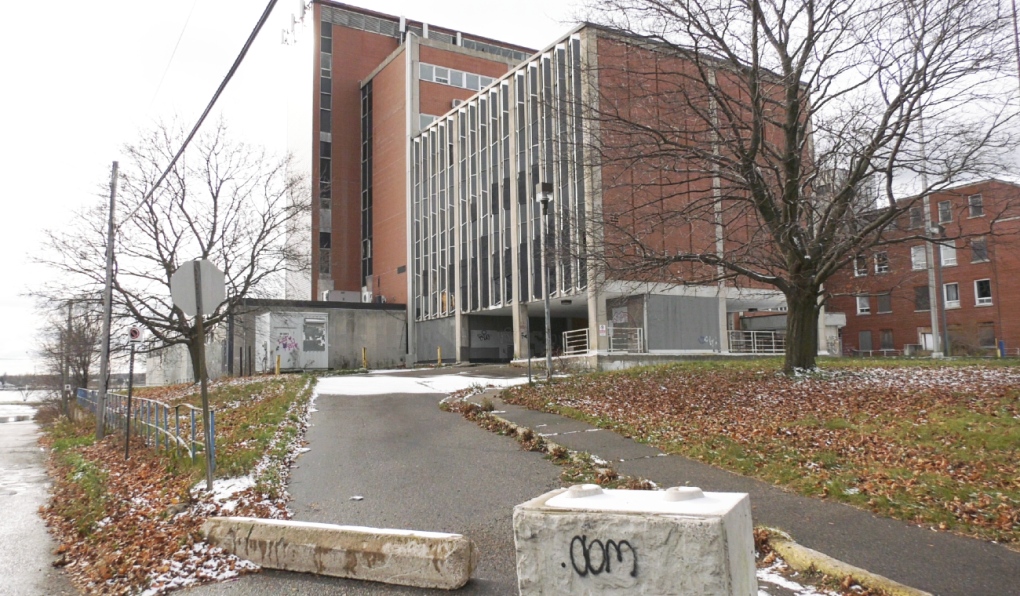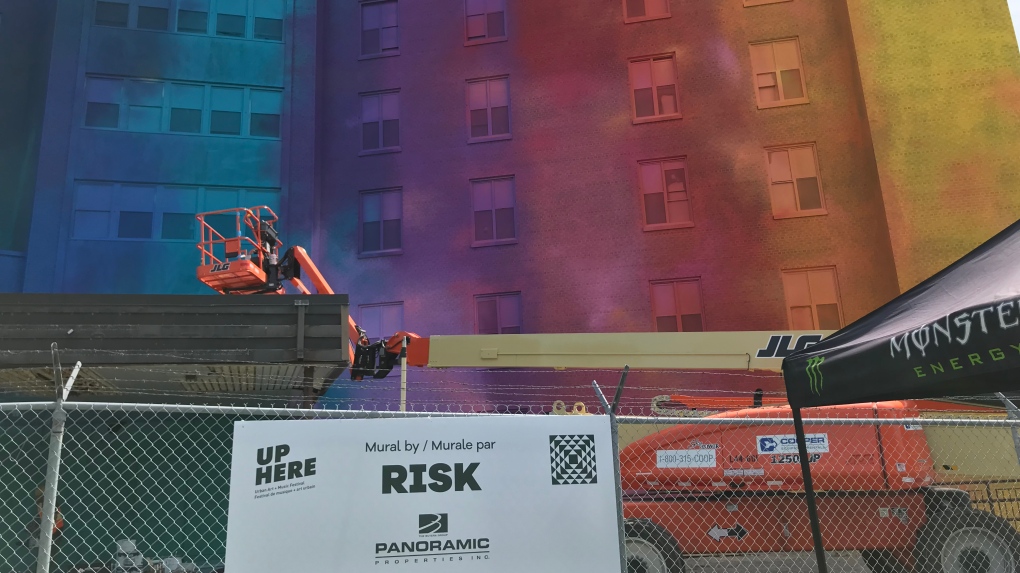Experts say there are options to deal with derelict buildings in Sault, Sudbury, but none are easy
It’s a new year and new mayors in Greater Sudbury and Sault Ste. Marie are taking on some of the challenges that long bedeviled their predecessors.
That includes what to do with former hospital buildings in each city that are now owned by the private sector.
 Buildings that fall below the city’s property standards are on the radar of Sault Ste. Marie’s new mayor. (Mike McDonald/CTV news)
Buildings that fall below the city’s property standards are on the radar of Sault Ste. Marie’s new mayor. (Mike McDonald/CTV news)
Both buildings are in prominent locations and were expected to be redeveloped by their new owners, but have fallen into serious disrepair and have become flashpoints for public anger.
Concerns range from squatters, vandalism and other safety issues to the fact the buildings have become very public and embarrassing eyesores.
"Basically, I’ve been working at this since I’ve been elected," Greater Sudbury Mayor Paul Lefebvre said in a recent interview with CTV News' Molly Frommer.
"I have talked to the owner on a few occasions and in the new year, we’ll have more information as that comes forward. So, very excited to see what 2023 will bring us with respect to that site."
 As part of the Sudbury’s annual Up Here Festival, work begins on what could be Canada’s biggest mural. (CTV Northern Ontario)
As part of the Sudbury’s annual Up Here Festival, work begins on what could be Canada’s biggest mural. (CTV Northern Ontario)
And Sault Ste. Marie's new Mayor Matthew Shoemaker said dealing with derelict buildings is something he has heard about from the public and is one of his top priorities.
"They’re worried about petty crimes with their vehicles that are parked outside, property crimes -- they can’t leave anything outside or anything of that nature," Shoemaker told CTV News' Mike McDonald.
"It’s a real problem."
WHAT CAN BE DONE?
Alexander 'AJ' Wray is a PhD candidate in the geography and environment department at the University of Western Ontario.
Wray said the problem of high-profile buildings becoming derelict is relatively common in Canadian municipalities, but solutions are more complicated.
"These brownfield sites are always a huge issue in cities because they have such complex histories," he said in a phone interview.
"They often have heritage designations or local community significance or on a piece of property that can be challenging to work with."
The issue becomes even more complicated when market forces change and redeveloping the site becomes a bigger financial risk. While it may make sense to developers to wait years for the best time to move forward, that leaves the city with a long-term problem.
Wray said one way to make progress is to offer incentives to the developer to begin work sooner rather than later. For example, community incentive programs encourage owners to improve their properties in exchange for tax and other relief.
"Development charges are waived or property taxes are waived, for example, for five years or 10 years," Wray said.
"Another approach that we've seen sometimes is a municipality themselves stepping up through an economic development agency and purchasing the property themselves."
Under that scenario, cities bring in other private-sector partners that develop a part of the property. He cited the example in London, Ont., where the city stepped in to redevelop the former Victoria Hospital.
"Then they parcelled the site to a group of community non-profit developers," Wray said.
"(It’s) currently under construction now (and it’s) going to have 80 per cent rent-geared-to-income units and the other 20 per cent are going to be market affordable units. So this massive property has now been turned into a brand new affordable housing development."
However, in cases where a developer is waiting for market forces to change, there’s not a whole lot a municipality can do, Wray said.
"You can't legally force someone to build something they don't want," he said.
Matti Siemiatycki is a professor at the University of Toronto’s department of geography and planning and director of the Infrastructure Institute.
Siemiatycki said there is much cities can do to encourage developers to move forward, but not much that can force their hand.
"They can use more of the 'carrots,' in terms of either financial incentives or zoning incentives or speeding up permits," he said.
"Those are some of the 'carrots,' but there's very few tools that they could use to require a developer to go faster."
He cited the former Maple Leaf Gardens in Toronto that sat idle for 10 years until a public/private partnership emerged, with Ryerson University using part of the building for its sports program and Loblaws building a grocery store, among other uses.
"(The building) sat there for a long time to the point where people were really concerned that the building … was going have to be demolished," Siemiatycki said.
"Ultimately, it got redeveloped as a mixed-use building, which is both gorgeous and really functional."
One measure that is less cooperative and more coercive is a vacancy tax – basically, tax developers have to pay if their building remains vacant.
Wray said vacancy taxes were used decades ago in some major U.S. cities when residents fled to the suburbs and some communities had commercial vacancy rates of 40-50 per cent.
More recently, they are being used to penalize foreign land speculators who buy overseas properties as investments without intending to use them.
The challenge is that it’s an expensive process that requires a lot of planning and must be used for an entire category of properties, not just aimed at a single developer.
"There’s a concern that you don’t want to punish a property owner when the market is down," Wray said.
"The challenge with vacancy taxes is (when) there's not many properties, the cost to administer the program often exceed the revenues you would obtain from the vacancy tax."
Cities have to decide whether to put resources into something like a vacancy tax or use them on incentives to convince the property owner to move forward.
"The question I think people need to ask themselves is that loss worth more than the incentives that provide the developers to actually lease their sites and do something with it?"
With files from CTV News videojournalist Molly Frommer in Sudbury and Mike McDonald in Sault Ste. Marie.
CTVNews.ca Top Stories

Firefighters battle to control devastating Los Angeles wildfires as ferocious winds calm somewhat
A fast-moving fire broke out in the Hollywood Hills on Wednesday night, threatening one of Los Angeles' most iconic spots as firefighters battled to get under control three other major blazes that killed five people, put 130,000 people under evacuation orders and ravaged communities from the Pacific Coast to inland Pasadena.
Canada could impose tariffs on U.S. steel, orange juice in response to Trump threat
Canadian officials are narrowing a list of American products to target in the event the federal government must respond to U.S. tariffs on Canadian goods, CTV News has confirmed.
NEW Tipping guide to Canada: When, where and how much to tip for restaurants, taxis and more
CTVNews.ca has created an entirely unofficial guide to tipping in Canada to help visitors, newcomers and curious Canadians navigate the shifting social norms of when, where and how much to tip.
'On the front line': Quebec planes and B.C. helicopters battle L.A. wildfires
Water-bombing pilots and crews from Quebec and a British Columbia company have been grappling with high winds and heavy turbulence in the battle against massive Los Angeles wildfires, as Canadians with homes in the area are forced to flee fast-moving flames.
Canadians want Ottawa and provinces to team up against Trump tariff threats: Nanos survey
A majority of Canadians want Ottawa and the provinces to team up against U.S. tariff threats, according to a new survey by Nanos Research.
Convicted Jan. 6 rioter arrested as fugitive in Whistler, B.C.
An American citizen convicted of participating in the Jan. 6, 2021, riot on Capitol Hill who said he was seeking asylum in Canada has been arrested as a "fugitive from U.S. justice," according to authorities.
U.S. says it has no plans to increase military presence in Greenland
The United States has no current plans to increase its military presence in Greenland, the U.S. embassy in Copenhagen said on Thursday, after President-elect Donald Trump expressed renewed interest in acquiring the vast Arctic island.
Can the U.S. really make Canada the 51st state?
Talk of Canada becoming the 51st American state has raised an existential question on this side of the border: Could it be done? Could the maple leaf make way to the stars and stripes? According to several experts, it may be possible, but not painless.
Overdose deaths in Ontario increasingly involve more than one drug, new report says
An increasing number of overdose deaths in Ontario involves the use of more than one drug, with the combination of opioids and stimulants proving to be especially dangerous, a new report says.

































